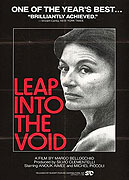
Regie:
Marco BellocchioDrehbuch:
Piero NatoliKamera:
Giuseppe LanciMusik:
Nicola PiovaniBesetzung:
Michel Piccoli, Anouk Aimée, Michele Placido, Gisella Burinato, Giovanni Frezza, Anna Orso, Antonio Piovanelli, Pier Giorgio Bellocchio (mehr)Inhalte(1)
A man worries about his sister's mental health, when she meets an actor who is pulling her out of her depression, he becomes jealous. (Guadalajara International Film Festival)
Kritiken (1)
If anyone is interested in what (not only Italian) bourgeoisie could be like, that bourgeoisie, as depicted in the cinema of the 1960s by Antonioni, Bertolucci, and Bellocchio after ten or fifteen years, that is, after reaching middle age, should watch A Leap in the Dark. When Antonioni and co. revealed the breakdown of communication and isolation among modern individuals, they showed them still in their youth. In 1980, Bellocchio shows a portrait of the modern bourgeoisie that is even more unbearable because the middle-aged bourgeoisie not only failed to overcome mutual alienation but also, as a result, failed to mature. Hence the complete infantility of the characters: at the beginning of the commentary, I wanted to use a journalistic shortcut to say that this film is like if the characters of Monica Vitti and Alain Delon from The Eclipse got married, "with the footnote that this is a relationship between brother and sister." However, this film proves precisely that the "footnote" is not just an addition and something in parentheses but that it is a necessary condition and necessary consequence of Antonioni and co.'s films. Therefore, the bourgeois characters must remain closed in the infantile isolation of childish games; neurosis and absolute inner weakness, compensated only by external imitation of social behavior or education, must be shattered by the mere presence of a real child, which brother and sister will never conceive, and therefore neither will all bourgeoisie. Impressive performances by M. Piccoli and A. Aimée.
()